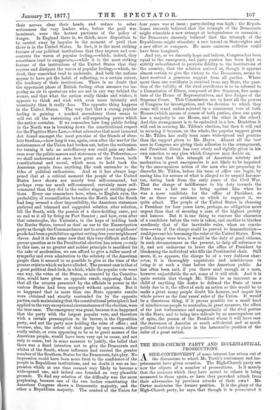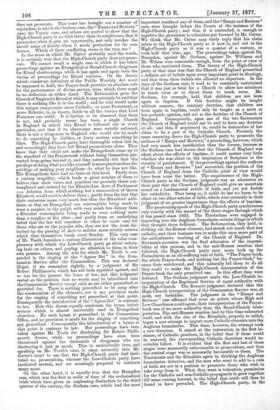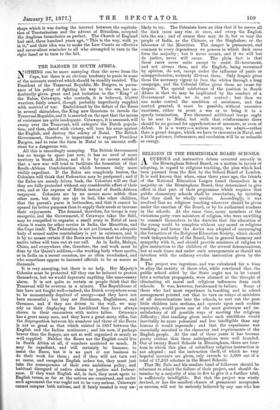THE HIGH-CHURCH PARTY AND ECCLESIASTICAL PROSECUTIONS.
A SIDE-CONTROVERSY of some interest has arisen out Of 11. the discussions to which Mr. Tooth's contumacy and im- prisonment have given occasion. The High-Church party are now the objects of a number of prosecutions. Is it merely that the measure which they have meted to others is being measured to them again, or have they provoked attack from their adversaries by previous attacks of their own? Mr. Carter maintains the former position. It is the glory of the High-Church party, he says, that though it is ,prosecuted it In the sense in which Mr. Carter probably used the words, even half that time, ago. The proceedings taken against Dr. it is certainly true that the High-Church party does not prose- Hampden, against Mr. Gorham, against Dr. Williams and cute. We cannot recall a single case in which it has taken Mr. Wilson were reasonable enough, from the point of view of proceedings against an Evangelical or Broad-Church clergyman those who instituted them. The theory of the High-Church for Ritual shortcomings, while it has again and again been the party at that time was that the Church of England prescribed victim of proceedings for Ritual excesses. On the theory a definite set of beliefs upon every important point in theology, which consistent defenders of the Public Worship Act must and that from these beliefs she allowed no departure. In the be supposed to hold, the Prayer-book provides an absolute rule days of the Gorham case, it used to be constantly maintained for the performance of divine service, from which there must that it was just as fatal for a Church to allow her ministers be no deflection on either hand. The Reformation gave the to teach error as to direct them to teach error. Mr. Church of England a Ritual of which it may certainly be said that Gorham, for example, held that children are not born there is nothing like it in the world ; and he who would make again in baptism. If this doctrine might be taught this unique compromise more Catholic, or more Protestant, or without censure, the contrary doctrine, that children are more Eclectic, is, in theory, liable to all the terrors that Lord born again in baptism, could only be taught as a more or Penzance can wield. It is further to be observed that there less probable opinion, and not as the doctrine of the Church of is not, and probably never has been, a single Church England. Consequently, upon one of the two Sacraments in England in which this Ritual is followed out in every the Church of England could not be said to have any doctrine particular, and that if its observance were strictly enforced, at all ; and this, if acquiesced in, would be destructive of her there is not a clergyman in England who would not be made claim to be a part of the Catholic Church. Precisely the to do something he dislikes, or leave undone something he same reasoning drove the High-Church party to prosecute the likes. The High-Church party have thoroughly taken this in, authors of " Essays and Reviews," a proceeding, however, which and accordingly they have left Ritual prosecutions alone. They had very much less justification than the former, because as knew that they could not make the Evangelicals come up to the Gorham ease had shown that the Church of England was the standard of the Prayer-book without being themselves pre- silent about the effects of baptism, it could matter very little vented from going beyond it, and they naturally felt that the whether she was silent on the inspiration of Scripture or the privilege of doing what you like yourself is more precious than the eternity of punishment. If the proceedings against the authors privilege of making your neighbour do what he does not like. of "Essays and Reviews " had succeeded, the position of the The Evangelicals have had no fears on this head. Partly from Church of England from the Catholic point of view would a curious stupidity, which leads a great number of them to have been none the better. The acquiescence of the High- believe that their views and practices are precisely those con- Church party in the Gorham judgment was an admission on templated and ordered by the Elizabethan Acts of Parliament their part that the Church of England could give an uncertain —a delusion from which nothing but a resurrection of Queen sound on a fundamental article of faith, and yet not forfeit Elizabeth would avail to deliver them ; partly from the fact that her catholicity. That being so, it could do her no harm to be their omissions mean very much less than the Ritualists' addi- silent on two other articles of faith, which were certainly in their tions, so that an Evangelical can contemplate being made to judgment of no greater importance than the effects of baptism.
wear a surplice in the pulpit with very much less dismay than The prosecuting epoch of the High-Church party synchronises a Ritualist contemplates being. made to wear nothing more very exactly with the second of the three stages through which than a surplice at the altar ; and partly from an underlying it has passed since 1833. The Tractarians were engaged in belief that the law will somehow or other be made easy for importing into the Anglican formularies certain things in which those who err on the popular side, they are not the least dis- they thought them deficient. The Reformation, they held, in turbed by the passing of Acts to enforce more strictly rubrics striking out the Roman element, had struck out much that was which they themselves break every Sunday. This very case catholic, and their business was to make this once more part of of Mr. Tooth furnishes a curious illustration of the calm corn- the authoritative teaching of the Church of England. Dr. placency with which the Low-Church party go about enforc- Newman's secession was the final admission of the impossi- ing laws on others, and paying no attention to them in their bility of this process, and in the anti-Roman reaction that own persons. Among the acts for which Mr. Tooth is sus- followed, the High-Church party once more took up the pended is the singing of the " Agnus Dei " in the Corn- Formularies as an all-sufficing rule of faith. "The Prayer-book, munion Service after the Consecration. This was declared the whole Prayer-book, and nothing but the Prayer-book," be- illegal, if we remember rightly, by a judgment of Sir came their watchword, and this naturally led them to do all Robert Phillimore's, which has not been appealed against, and they could to make the High-Church interpretation of the so has for the present the force of law, and this judgment Prayer-book the only permitted one. In this effort they were rested on the position that no words may be introduced into defeated. The Gorham judgment made the Low-Church in- the Communion Service except such as are either prescribed or terpretation of the Baptismal Service of equal authority with provided for. There is nothing prescribed to be sung after the High-Church. The Bennett judgment declared that the the consecration of the elements, nor is any provision made High-Church interpretation of the Communion Service was, at for the singing of something not prescribed at that point. most, not forbidden. The judgment in the "Essays and Consequently the introduction of the " Agnus Dei " is contrary Reviews" case affirmed that even on points where High and to law. Now this decree equally condemns the hymn before Low Churchmen could agree, their interpretation of the Prayer- sermon which is almost universally used in Evangelical book was of no more authority than the Broad-Church inter- churches. No such hymn is prescribed in the Communion pretation. The anti-Roman reaction had by this time exhausted Office, and no provision is made for the singing of something itself, and with the rise of the Ritualists, properly so called, not prescribed. Consequently the introduction of a hymn at began a new attempt to import more Catholic elements into the this point is contrary to law. But proceedings have been Anglican formularies. This time, however, the attempt took taken against Mr. Tooth for disobeying Sir Robert Philli- a new direction. It aimed at the restoration, in the first in- more's decree, while no proceedings have even been stance, of Catholic practices, in the belief that if these could -threatened against the thousands of clergymen who are be restored, the corresponding Catholic doctrines would in- disobeying it just as much. This is undoubtedly true, and evitably follow. It is evident that the first and last of these -speaking on Mr. Tooth's case, it came naturally into Mr. stages were necessarily unfavourable to prosecutions, and that Carter's mind to say that the High-Church party had insti- the central stage was as necessarily favourable to them. The tilted no prosecutions, whereas the Low-Church party have Tractarians and the Ritualists agree in thinking the Anglican instituted several, and are seemingly prepared to institute formularies defective, and the men who want to add to a rule many more, of faith are not in a position to prosecute those who wish to On the other hand, it is equally true that the Hampden take away from it. What they want is toleration, permission case, which was the first in order of time of the ecclesiastical for the Catholic and non-Catholic propaganda to grow together trials which have given an unpleasing distinction to the third till some corning harvest, in the belief that truth will than be quarter of the century, the Gorham case, which had the most found to have prevailed. The High-Church party, in the does not prosecute. This boast has brought out a number of important results of any of them, and the "Essays and Reviews" rejoinders, in which the Gorham case, the " Essays and Reviews " case, were brought before the Courts at the instance of the case, the Voysey case, and others are quoted to show that the High-Church party ; and this, it is contended, is enough to High-Church party is no whit better than its neighbours, that it negative the pretension to toleration put forward by Mr. Carter. persecutes when it gets an opportunity, and only invokes the We think that Mr. Carter may fairly reply that his claim sacred name of liberty when it needs protection for its own refers to the High-Church party as it now is, and not to the licence. Which of these conflicting views is the true one ? High-Church party as it was a quarter of a century, or In the sense in which Mr. Carter probably used the words, even half that time, ago. The proceedings taken against Dr. it is certainly true that the High-Church party does not prose- Hampden, against Mr. Gorham, against Dr. Williams and cute. We cannot recall a single case in which it has taken Mr. Wilson were reasonable enough, from the point of view of proceedings against an Evangelical or Broad-Church clergyman those who instituted them. The theory of the High-Church for Ritual shortcomings, while it has again and again been the party at that time was that the Church of England prescribed victim of proceedings for Ritual excesses. On the theory a definite set of beliefs upon every important point in theology, which consistent defenders of the Public Worship Act must and that from these beliefs she allowed no departure. In the be supposed to hold, the Prayer-book provides an absolute rule days of the Gorham case, it used to be constantly maintained for the performance of divine service, from which there must that it was just as fatal for a Church to allow her ministers be no deflection on either hand. The Reformation gave the to teach error as to direct them to teach error. Mr. Church of England a Ritual of which it may certainly be said that Gorham, for example, held that children are not born there is nothing like it in the world ; and he who would make again in baptism. If this doctrine might be taught this unique compromise more Catholic, or more Protestant, or without censure, the contrary doctrine, that children are more Eclectic, is, in theory, liable to all the terrors that Lord born again in baptism, could only be taught as a more or Penzance can wield. It is further to be observed that there less probable opinion, and not as the doctrine of the Church of is not, and probably never has been, a single Church England. Consequently, upon one of the two Sacraments in England in which this Ritual is followed out in every the Church of England could not be said to have any doctrine particular, and that if its observance were strictly enforced, at all ; and this, if acquiesced in, would be destructive of her there is not a clergyman in England who would not be made claim to be a part of the Catholic Church. Precisely the to do something he dislikes, or leave undone something he same reasoning drove the High-Church party to prosecute the likes. The High-Church party have thoroughly taken this in, authors of " Essays and Reviews," a proceeding, however, which and accordingly they have left Ritual prosecutions alone. They had very much less justification than the former, because as knew that they could not make the Evangelicals come up to the Gorham ease had shown that the Church of England was the standard of the Prayer-book without being themselves pre- silent about the effects of baptism, it could matter very little vented from going beyond it, and they naturally felt that the whether she was silent on the inspiration of Scripture or the privilege of doing what you like yourself is more precious than the eternity of punishment. If the proceedings against the authors privilege of making your neighbour do what he does not like. of "Essays and Reviews " had succeeded, the position of the The Evangelicals have had no fears on this head. Partly from Church of England from the Catholic point of view would a curious stupidity, which leads a great number of them to have been none the better. The acquiescence of the High- believe that their views and practices are precisely those con- Church party in the Gorham judgment was an admission on templated and ordered by the Elizabethan Acts of Parliament their part that the Church of England could give an uncertain —a delusion from which nothing but a resurrection of Queen sound on a fundamental article of faith, and yet not forfeit Elizabeth would avail to deliver them ; partly from the fact that her catholicity. That being so, it could do her no harm to be their omissions mean very much less than the Ritualists' addi- silent on two other articles of faith, which were certainly in their tions, so that an Evangelical can contemplate being made to judgment of no greater importance than the effects of baptism. shape which it was during the interval between the capitula- tion of Tractarianism and the advent of Ritualism, accepted the Anglican formularies as perfect. The Church of England had said, three hundred years ago, "This is the way, walk ye in it," and their idea was to make the Law Courts an effective and never-silent reminder to all who attempted to turn to the right hand or to turn to the left.




































 Previous page
Previous page